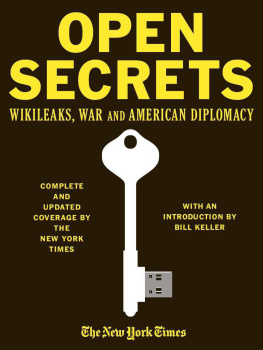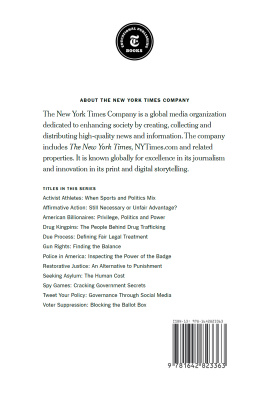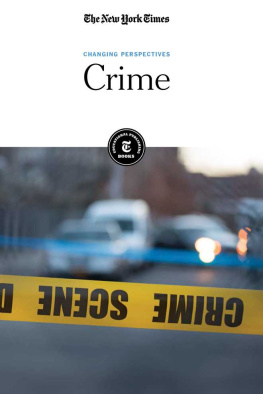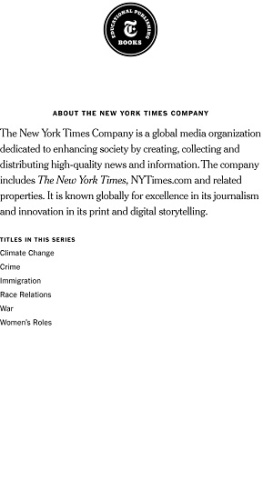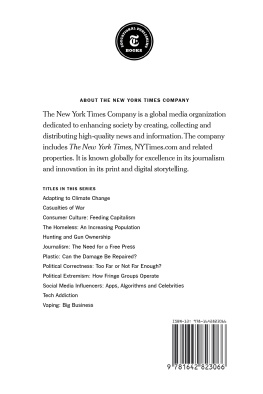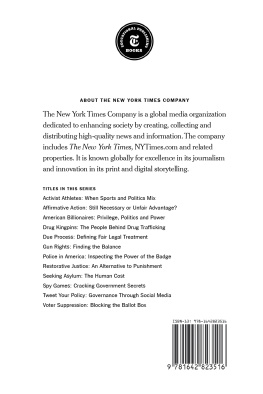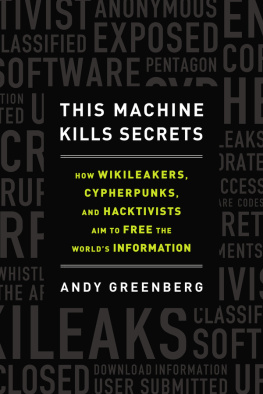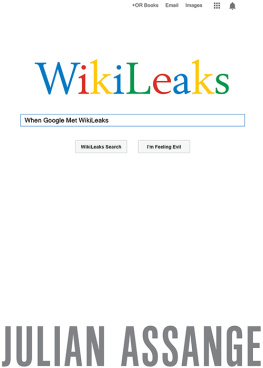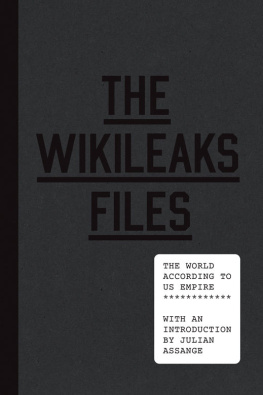The New York Times Staff - Open Secrets: WikiLeaks, War and American Diplomacy
Here you can read online The New York Times Staff - Open Secrets: WikiLeaks, War and American Diplomacy full text of the book (entire story) in english for free. Download pdf and epub, get meaning, cover and reviews about this ebook. year: 2011, publisher: The New York Times Company, genre: History. Description of the work, (preface) as well as reviews are available. Best literature library LitArk.com created for fans of good reading and offers a wide selection of genres:
Romance novel
Science fiction
Adventure
Detective
Science
History
Home and family
Prose
Art
Politics
Computer
Non-fiction
Religion
Business
Children
Humor
Choose a favorite category and find really read worthwhile books. Enjoy immersion in the world of imagination, feel the emotions of the characters or learn something new for yourself, make an fascinating discovery.
- Book:Open Secrets: WikiLeaks, War and American Diplomacy
- Author:
- Publisher:The New York Times Company
- Genre:
- Year:2011
- Rating:4 / 5
- Favourites:Add to favourites
- Your mark:
- 80
- 1
- 2
- 3
- 4
- 5
Open Secrets: WikiLeaks, War and American Diplomacy : summary, description and annotation
We offer to read an annotation, description, summary or preface (depends on what the author of the book "Open Secrets: WikiLeaks, War and American Diplomacy " wrote himself). If you haven't found the necessary information about the book — write in the comments, we will try to find it.
Open Secrets: WikiLeaks, War and American Diplomacy — read online for free the complete book (whole text) full work
Below is the text of the book, divided by pages. System saving the place of the last page read, allows you to conveniently read the book "Open Secrets: WikiLeaks, War and American Diplomacy " online for free, without having to search again every time where you left off. Put a bookmark, and you can go to the page where you finished reading at any time.
Font size:
Interval:
Bookmark:
Complete and Updated Coverage
by The New York Times
Introduction by Bill Keller
Edited by Alexander Star
Art Director Anne Leigh
Cover Design Sarah A. Cohen
Open Secrets: WikiLeaks, War and American Diplomacy
Introduction, reporting and analysis 2011 The New York Times.
For excerpts of cables and other United States government material, no copyright claim is made.
ISBN: 978-0-615-43957-0
The New York Times
620 8th Ave.
New York, NY 10018
An air of intrigue verging on paranoia permeated the project, perhaps understandably, given that we were dealing with a mass of classified material and a source who acted like a fugitive changing crash pads, e-mail addresses and cellphones frequently.
from The Boy Who Kicked the Hornets Nest
By Bill Keller
By BILL KELLER
In June 2010, Alan Rusbridger, the editor of the London daily newspaper The Guardian, phoned me and asked, mysteriously, whether I had any idea how to arrange a secure communication. Not really, I confessed. The Times doesnt have encrypted phone lines, or a Cone of Silence. Well then, Alan said, he would try to speak circumspectly. In a roundabout way, he laid out an unusual proposition: An organization called WikiLeaks, a secretive cadre of anti-secrecy vigilantes, had come into possession of an enormous amount of classified U.S. government communications. WikiLeakss leader, an eccentric former computer hacker of Australian birth and no fixed residence, had offered The Guardian half a million military dispatches from the battlefields of Afghanistan and Iraq. There might be more after that, including an immense bundle of confidential diplomatic cables. The Guardian had suggested both to increase the impact and to share the labor of handling such a trove that The New York Times be invited to share this exclusive bounty. The source had agreed. Was I interested?
I was interested.
The adventure that ensued over the next six months combined the cloak-and-dagger intrigue of handling a vast secret archive with the more mundane feat of sorting, searching and understanding a mountain of data. As if that was not complicated enough, the project also entailed a source who was elusive, manipulative and volatile (and ultimately openly hostile to both The Times and The Guardian), an international cast of journalists, company lawyers committed to keeping us within the bounds of the law, editors wrestling with some potent ethical questions and an array of government officials who sometimes seemed as though they couldnt decide whether they wanted to engage us or arrest us. By the end of the year, the story of this wholesale security breach had outgrown the story of the actual contents of the secret documents, and had generated much breathless speculation that something journalism, diplomacy, life as we knew it had profoundly changed forever.
The fruits of this endeavor the scores of articles produced by The Times and the documents that support them, along with the commentary published in our opinion pages are compiled in this volume, in the belief that they will be of interest to anyone who follows Americas relationship with the rest of the world. We have included an expanded profile by our London bureau chief, John Burns, and his collaborator Ravi Somaiya of Julian Assange, the man who set this curious story in motion. We have also included a summary of the feverish reactions, pro and con, and essays by some of the correspondents involved on what it all means. In this introduction I will lay out in some detail what we did and why we did it.
Soon after Alan Rusbridgers call, we sent Eric Schmitt from our Washington bureau to London. Eric has covered military affairs expertly for years, has read his share of classified military dispatches, and has excellent judgment and an unflappable demeanor. His main assignment was to get a sense of the material. Was it genuine? Was it of public interest? He would also report back on the proposed mechanics of our collaboration with The Guardian and the German magazine Der Spiegel, which Assange had invited in as a third consumer of his secret smorgasbord. Eric would also meet the WikiLeaks leader, who was known to a few Guardian journalists but not to us.
Erics first phone call home was encouraging. There was no question in his mind that the Afghanistan dispatches were genuine. They were fascinating, a ground-up diary of a troubled war. And there were intimations of more to come especially classified cables from the entire constellation of American diplomatic outposts. WikiLeaks was holding those back for now, presumably to see how this venture in dealing with the establishment media worked out. Over the next few days, Eric huddled in a discreet office at The Guardian, sampling the trove of war dispatches and discussing the complexities of this project: how to organize and study such a voluminous cache of information; how to securely transport, store and share it; how journalists from three very different publications would work together without compromising their independence; how to publish responsibly material laden with risks; and how we would ensure an appropriate distance from Julian Assange. We regarded Assange throughout as a source, not as a partner or collaborator, but he was a man who clearly had his own agenda.
By the time of the meetings in London, WikiLeaks had already acquired a measure of international fame, or, depending on your point of view, notoriety. Shortly before I got the call from The Guardian, The New Yorker had published a rich and colorful profile of Assange by Raffi Khatchadourian, who had embedded with the group. WikiLeakss biggest coup to that point had been the release, last April, of video footage taken from one of two U.S. helicopters involved in firing down on a crowd and a building in Baghdad in 2007, killing at least 18 people. While some of the people in the video were armed, others gave no indication of menace; two were in fact journalists for the Reuters news agency. The video, with its soundtrack of callous banter, was horrifying to watch, and was an embarrassment to the U.S. military. But WikiLeaks, in its zeal to make the video a work of antiwar propaganda, also released a version that didnt call attention to an Iraqi who was toting a rocket-propelled grenade and packaged the manipulated version under the tendentious rubric Collateral Murder. [To access both videos, go to
http://nyti.ms/opensec]
Assange was, throughout our dealings, coy about where he had obtained his secret cache. But the suspected source of the video, as well as the military dispatches and the diplomatic cables to come, was a disillusioned Army private first class named Bradley Manning, who had been arrested and was being kept in solitary confinement.
On the fourth day of the London meeting, Julian Assange slouched into The Guardians office, a day late. Eric took his first measure of the man who would be a large presence in our lives: Hes tall probably 6-2 or 6-3 and lanky, with pale skin, gray eyes and a shock of white hair that seizes your attention, Eric wrote to me later. He was alert but disheveled, like a bag lady walking in off the street, wearing a dingy, light colored sports coat and cargo pants, dirty white shirt, beat-up sneakers and filthy white socks that collapsed around his ankles. He smelled as if he hadnt bathed in days.
Assange shrugged a huge backpack off his shoulders and pulled out a stockpile of laptops, cords, cellphones, thumb drives and memory sticks that held the WikiLeaks secrets.
The reporters had begun preliminary work on the Afghanistan field reports, using a large Excel spreadsheet to organize the material, then plugging in search terms and combing the documents for newsworthy content. They had run into a puzzling incongruity. Assange had said the data included dispatches from the beginning of 2004 through the end of 2009. But the material on the spreadsheet ended abruptly in April 2009. A considerable amount of material was missing. Assange, slipping naturally into the role of office geek, explained that they had hit the limits of Excel. Open a second spreadsheet, he instructed. They did, and the rest of the data materialized a total of 92,000 reports from the battlefields of Afghanistan.
Font size:
Interval:
Bookmark:
Similar books «Open Secrets: WikiLeaks, War and American Diplomacy »
Look at similar books to Open Secrets: WikiLeaks, War and American Diplomacy . We have selected literature similar in name and meaning in the hope of providing readers with more options to find new, interesting, not yet read works.
Discussion, reviews of the book Open Secrets: WikiLeaks, War and American Diplomacy and just readers' own opinions. Leave your comments, write what you think about the work, its meaning or the main characters. Specify what exactly you liked and what you didn't like, and why you think so.

